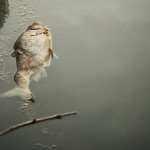 Killing a river is the outcome of a systematic process. The key is strict control of public perception throughout the process.
Killing a river is the outcome of a systematic process. The key is strict control of public perception throughout the process.
The first and most important principle is to omit any mention of the river except when absolutely necessary. This is the single most important and easily overlooked tactic. While it may be necessary to mention the river, it is imperative that as soon as possible the river be reduced to water only.
Once water is the focal point, the water must become a commodity. The process is simple: convert the water to acre feet and the acre feet to dollars. Only when the water has been commodified will destruction of the river follow as the inevitable result of the systematic application of tested principles of omission.
To extract the full value of the water, it must be made to seem both cheap and abundant. Since most people see water only when it comes out of the tap or garden hose, this is easy to do. While making the water seem cheap and abundant, you must at the same time introduce the fear that unless the water is used up, it will become scarce and expensive.
A few philosophers and pinheads may notice this is internally contradictory. Characterize them as “shrill” and “unreasonable.”
Once the water is commodified, there follows a series of crucial omissions. These steps are of utmost necessity. The goal is to obliterate from consciousness any living thing associated with the river.
Never mention mammals, especially beavers. These loathsome rodents have been made popular by televised nature shows and should not be associated with the dying river in any way. Never mention river otters. If pressed to discuss animal life, have ready a set piece on nutria. Refer to them as “water rats.”
Mention of birds should be avoided at all costs. If absolutely necessary, refer to “mud hens.” Egrets, herons, and ducks should never be mentioned. Never under any circumstances mention Bald Eagles.
While it will be necessary from time to time to mention fish, avoid references to specific kinds of fish whenever possible. Avoid mention of salmon unless absolutely necessary. When discussing salmon, always use the phrase, “anadromous fish.” It sounds foreign and therefore menacing. If you must mention any other fish, refer to carp and smelt. It’s okay to use colloquialisms like “bottom feeders” and “trash fish.”
Never mention fisheries or fishermen.
In keeping with the dictum to avoid mentioning fishermen, take special care to avoid any mention of trout, trout fishing, trout fishermen, or fly fishing. Trout fishermen, also known as fly fishermen, are practitioners of deception, and thus devious. They are ruthless and implacable opponents who will stoop to any tactic, even invoking law. Like the river itself, they can be defeated only by omission. They must never be acknowledged in any way.
It goes without saying that we must avoid discussion of the quality of the water in the river. If for some reason it becomes necessary to discuss water quality, never use the word, “pollution,” especially when apt. Instead, use words like “eutrophication” and “turbidity,” whether or not called for. Because only a tiny few know what these words mean, the majority will soon lose interest altogether.
It is now evident that killing a river is almost entirely a matter of removing it from consciousness through a systematic process of omission. Deviation from the fundamental steps in this process gives the river life and results in tremendous waste of a precious natural resource. Decades of research and practical application have taught us how to extract the maximum value from the river. Death of the river is merely a necessary consequence of this beneficial process of extraction.

Beautifully written and sadly true.